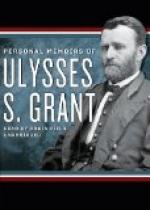Besides the argument used by my father in favor of my going to West Point—that “he thought I would go”—there was another very strong inducement. I had always a great desire to travel. I was already the best travelled boy in Georgetown, except the sons of one man, John Walker, who had emigrated to Texas with his family, and immigrated back as soon as he could get the means to do so. In his short stay in Texas he acquired a very different opinion of the country from what one would form going there now.
I had been east to Wheeling, Virginia, and north to the Western Reserve, in Ohio, west to Louisville, and south to Bourbon County, Kentucky, besides having driven or ridden pretty much over the whole country within fifty miles of home. Going to West Point would give me the opportunity of visiting the two great cities of the continent, Philadelphia and New York. This was enough. When these places were visited I would have been glad to have had a steamboat or railroad collision, or any other accident happen, by which I might have received a temporary injury sufficient to make me ineligible, for a time, to enter the Academy. Nothing of the kind occurred, and I had to face the music.
Georgetown has a remarkable record for a western village. It is, and has been from its earliest existence, a democratic town. There was probably no time during the rebellion when, if the opportunity could have been afforded, it would not have voted for Jefferson Davis for President of the United States, over Mr. Lincoln, or any other representative of his party; unless it was immediately after some of John Morgan’s men, in his celebrated raid through Ohio, spent a few hours in the village. The rebels helped themselves to whatever they could find, horses, boots and shoes, especially horses, and many ordered meals to be prepared for them by the families. This was no doubt a far pleasanter duty for some families than it would have been to render a like service for Union soldiers. The line between the Rebel and Union element in Georgetown was so marked that it led to divisions even in the churches. There were churches in that part of Ohio where treason was preached regularly, and where, to secure membership, hostility to the government, to the war and to the liberation of the slaves, was far more essential than a belief in the authenticity or credibility of the Bible. There were men in Georgetown who filled all the requirements for membership in these churches.
Yet this far-off western village, with a population, including old and young, male and female, of about one thousand—about enough for the organization of a single regiment if all had been men capable of bearing arms—furnished the Union army four general officers and one colonel, West Point graduates, and nine generals and field officers of Volunteers, that I can think of. Of the graduates from West Point, all had citizenship elsewhere at the breaking out of the rebellion, except possibly General A. V.




